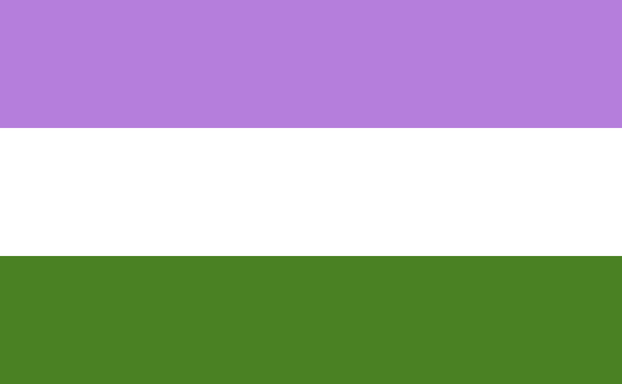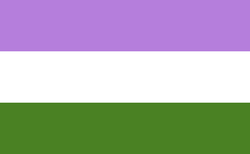The English languages pushes people to use gendered constructions when referring to people, like referring to them as "she", "he", "him/her", or "hers/his". Many transgender people prefer the pronouns of a binary gender, which can be the same pronouns of their assigned birth sex, but is usually that of the "opposite" sex.
A lot of genderqueer people though, do not want to be referred to in this way, and instead prefer gender neutral pronouns.
Singular They/them/their
The pronouns they/them/their can be used to refer to individual people. Contrary to what some people think, this usage is grammatically correct and has been used continuously since the mid 14th century. It is most commonly used in casual speech, when referred to a generic person, or a person whose gender is unknown, for example:
- "Someone left their umbrella."
- "What does that driver think they're doing?!?"
- "If anyone asks where I am, you can tell them I went next door."
More recently, nonbinary and genderqueer people have come to start advocating use of these pronouns to refer to themselves.
Singular they is currently the most widely accepted gender neutral pronoun, and it is the most common. Singular they is the safest way to refer to a person, the least likely to offend them, if you do not know their gender.
Other pronouns
There are many other sets of gender-neutral pronouns. Some of the most popular ones include Ze, which can take the forms Ze/Zir/Zir or Ze/Hir/Hir, and the Spivak pronouns, ey/em/eir, which sound a lot like "they/them/their" but without the "th", or Xe/xem/xyr. Slightly less common are Ne/nem/nir and Ve/ver/vis.
Nonbinary and genderqueer people using gendered pronouns
Not all nonbinary people want to use gender-neutral pronouns for themselves. Some people prefer to stick with the pronouns of their assigned birth sex, out of familiarity, ease of use, or a desire not to impose on others. Other people prefer to use the binary pronouns associated with the opposite of their assigned birth sex, so as to emphasize their transgender status, or in an attempt to induce people to see or treat them more the way they want to be treated.
Cis and binary trans people using gender-neutral pronouns
There are also cis and binary trans people who prefer gender-neutral pronouns for other reasons, including political or ideological reasons, or just personal preference. Gender-neutral pronouns were actively advocated by some feminists for years before nonbinary gender identities became widely known.





 The Shaming of Femininity and Elevation of Masculinityon 07/13/2017
The Shaming of Femininity and Elevation of Masculinityon 07/13/2017
 Resources for Learning Spanish Free Onlineon 04/13/2016
Resources for Learning Spanish Free Onlineon 04/13/2016
 Ways Native Plants Can Help Control Invasive Plantson 05/26/2016
Ways Native Plants Can Help Control Invasive Plantson 05/26/2016
 What is a Sedge? How is it Different From a Grass?on 08/11/2015
What is a Sedge? How is it Different From a Grass?on 08/11/2015


Questions? Comments? Feedback?
This is useful information, for I have taken an interest in the subject of dysphoria, and am sympathetic to those who undergo what is essentially a heavy burden.
Thanks! I do think talking about this is important.
Experiences of body dysphoria are super diverse among nonbinary people, as well as specific identities like genderfluid. I'm active in a lot of online communities and have heard countless people's personal accounts, and there's the full range of experiences from zero dysphoria to crippling dysphoria. I do get the sense that binary trans people are more likely to feel dysphoria but that's also hugely variable, I know quite a few binary trans people who also experience no body dysphoria.
I think there's a large degree to which whether or not a person experiences dysphoria is actually a function of their overall mental state. For example, a person who has a more negative experience overall in life, and at the extreme, a person who is clinically depressed, might experience certain things being the way they want them to be as "neutral", and them not being the way they want as upsetting, unsettling, or things feeling wrong. Thus they might feel body dysphoria, and have it alleviated if certain changes are made. But a person who has a more positive experience overall and who has no symptoms of depression, might feel things as "neutral" even if their body isn't exactly how they like, and they experience a positive experience or feeling, like a sense of "euphoria", feelings of empowerment, happiness, fulfillment, etc. if they make certain changes. This is perhaps an oversimplification but I definitely notice this trend in my own life with respect to certain gendered changes of self-expression that I've made.
Body Dysphoria! How common is it among gender fluid/transgender/non-binary people?
Your honesty about your life does you great credit. This ability to speak openly about this issue is a good example to others who struggle with these difficulties.
Yeah, there's definitely a mix of like...innate qualities, and socialized qualities, that combine to form people's experience of gender.
I have felt certain strong innate tendencies that conflict with how I was socialized. For example, as a kid I would sometimes exhibit more stereotypically "feminine" body language, and then I would be bullied for this by peers, and also discouraged from it by adults. A deeper example, I spent years in academia in mathematics, a heavily male-dominated field. Although I was always perceived as male, I found that I would often be criticized, dismissed, excluded, and sometimes even explicitly shamed, when I expressed desires or values considered stereotypically "feminine", like a cooperative rather than competitive attitude, a desire to talk openly about my feelings more, a desire to both live out and be treated with a nurturing and caring attitude. I was explicitly told that my desires and attitude were "unrealistic", "inappropriate", and things like that, told things like "that's just not the way it is", or have my views laughed at. Another example is that I experience emotions strongly and I can cry easily, but this was suppressed by society, the whole "boys don't cry" thing. Now that I've overcome this socialization and I do cry more easily, I occasionally deal with people attacking me verbally, especially if I start crying during an argument with a man.
In my case, it is less that I felt trapped in my body, and more that my body and mind naturally functioned in ways that many people in society didn't always like, want, or accept, and would sometimes pathologize or demonize.
But many nonbinary and genderqueer people do feel a lot of body dysphoria.
I do think this is related to homophobia and males being persecuted or bullied for being gay. I was called "gay" a lot as a kid, which I knew wasn't true because I was strongly attracted to girls and not strongly attracted to boys, and knew that from a pretty young age, maybe around 5th grade? But I'd get labeled "gay" for displaying feminine characteristics like body language, vocal inflection, or even interests or ways of thinking or acting. I think I've always had a lot of solidarity with gay people and support for issues that affect gay people, because of this.
A thoughtful article! Gender raises huge issues. The experience of transgender/gender fluid etc people shows us that gender is not merely imposed, but it surges up within us and imposes itself, as does the gender to which we are attracted. We simply have no control over these feelings, so it is not merely from conditioning that gender arises,for gender is sometimes anti what society imposes. Society should respect this reality.
The accumulated experience of the human race is that male and female bodies seem to correlate with masculinity and femininity, each of which seems to fit a particular body. But that is not the final or full answer, for, like yourself, there are people who do not fit into this pattern, and these people are real, have feelings and can be hurt, often badly in their emotions and sometimes physically. Being trapped in a body that does not allow you to express yourself is miserable. There is a related issue in that sensitive, heterosexual males are sometimes persecuted for being gay, as the macho male stereotype excludes sensitivity. This too is a gender issue.
I was particularly interested in the case of Aiofe Assumpta Hart, whose transgender story is interesting to me as it touches upon my own interest in religious matters.